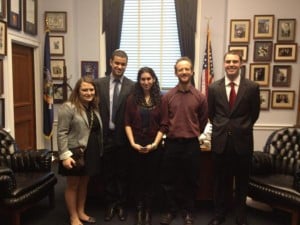
When I applied for AJWS’s Volunteer Summer program in Uganda, I knew that my stay in Ramogi Village would be temporary: seven weeks of volunteering, cultural exchange, education and travel. I never predicted that the experience would permanently impact the way I live my life—then, as a regular college student, and now as a proud Jewish global citizen.
On Monday, February 27th, I joined over 40 AJWS alumni to lobby Congress to reform the 2012 U.S. Farm Bill and create a more flexible and sustainable approach to international food aid.
During my time on Capitol Hill, my experience in Uganda and the people of Ramogi Village were in the forefront of my mind. When speaking to congressional assistants, I asked them to reform the U.S. Farm Bill in ways that expressed solidarity—not pity—with people in the Global South; the same kind of connection that I cultivated with the community in Ramogi Village. Shipping food from the United States to countries thousands of miles away is wasteful, inefficient and also creates dependency. Empowering communities to build up their local economies through vouchers and cash benefits is a long-term investment in economic independence. Our current policies undermine local farmers by inhibiting their ability to sell their own crops. Foreign food aid floods local markets and is distributed far below market price or, sometimes, even for free. This means that local farmers cannot compete in the global market.
There is no doubt that famine still exists in many parts of the developing world and, sometimes, emergency food aid is essential. But, more often than not, the issue is not food scarcity but, rather, limited food access. In Ramogi Village, most community members are sustenance farmers who sell a tiny portion of their crops to pay for medical bills and school fees. The presence of food aid prevents them from earning their small salaries, which drives them further into poverty.

I’ve learned that advocacy and service are intrinsically linked. We need to advocate for policies that address the root causes of injustice. But we also need to volunteer on the ground to alleviate the immediate symptoms of injustice and to build meaningful relationships.
As an advocate for food aid reform, my knowledge of the issue stems from time spent in the Global South, as well as knowledge gained from being part of AJWS’s greater Reverse Hunger campaign.
My summer in Uganda was the beginning of a lifelong commitment to justice through faith. Yesterday, my brief foray into lobbying was the obvious next step on my path to Jewish global citizenship. When I spoke to the congressional aides about the Farm Bill, my passion came from a desire to act upon this promise.
Our current Farm Bill implements policies that do not sustainably support rural communities in the Global South. By reforming the bill, we can help build communities that, overtime, will not depend on outside sources for aid, but will have the infrastructure and resources to support themselves. While some cases do dictate a need for immediate food aid, by adopting a more flexible approach, we can enable communities like Ramogi Village to become self-sufficient and sustainable on their own terms.
Izzy Parilis is a junior at The George Washington University studying Human Services and Psychology. Since returning from Volunteer Summer in Uganda, she has continued to volunteer at a variety of DC area non-profits that focus on hunger and homelessness. She is constantly looking for new ways to connect her passions for social justice and Judaism. If you have any exciting ideas, let her know via tweet (@isapar) or email (Isabel.parilis@gmail.com).
AJWS’s work in countries and communities changes over time, responding to the evolving needs of partner organizations and the people they serve. To learn where AJWS is supporting activists and social justice movements today, please see Where We Work.

